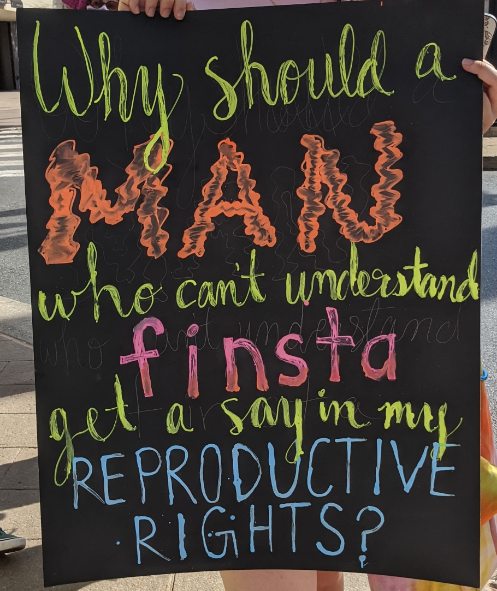New Texas abortion law reignites ongoing controversy
Nov 4, 2021
This previously ran in our October 2021 print issue.
The Texas law banning all abortions post-six weeks, also referred to as the “heartbeat bill,” is generating heated reactions across the country.
The new legislation essentially bans abortions six weeks past the patient’s last menstrual cycle. The law was enacted on May 19, after receiving the signature of Republican Gov. Greg Abbott. However, the law was not to be implemented until September.
In the past, cases such as Roe v. Wade, which was decided in 1973, allowed for abortions prior to fetal viability (the point at which the fetus could survive outside of the mother’s body), or around 22 weeks.
Senior Gwen Simons agrees whole-heartedly with the precedent set in Roe v. Wade.
“They set really fair standards for abortion, that I agree with, of not restricting it in the first trimester, and then being allowed to restrict it once the fetus becomes viable,” Simons said.
Instead of leaving the government, either state or federal, to enforce the law, the legislation passes control to the citizens. If a doctor performs an abortion on a patient, they, as well as anyone else involved in the aid or protection of the patient, can be sued, not the patient themselves. Citizens are given a $10,000 incentive if they win the case against anyone who helped the abortion take place.
All serial plaintiffs are protected, meaning they can sue repeatedly without having to pay for each separate case brought before the court. Additionally, a plaintiff can sue up to four years after an abortion took place.
During the beginning of September, Dr. Alan Braid, an OB/GYN in San Antonio, was sued for performing an abortion that violated the new legislation. Both plaintiffs are pro-choice and are suing with the intention of bringing the law itself up to question. The plaintiffs include Oscar Stilley, a former Arkansas lawyer facing a 15-year federal sentence for tax fraud, as well as Felipe Gomez, who self-identifies as a “pro-choice plaintiff.”
Brian Pum, a government and politics teacher at Emmaus, commented on the future of this case and how Dr. Braid will defend his stance.
“I think the law is going to be found unconstitutional,” Pum said. “I think [Dr. Braid] will use the backing that the due process of the 14th Amendment was being violated, [and] he might try to also include the equal protection clause.”
If this law was held to be constitutional, then it would open the doors for more legislation of its kind, where citizens enforce the laws set upon the nation.
Regarding the court’s refusal to make a decision on the case right away, “I think they wanted to let it play out, to set a precedent that allows citizens to take up constitutional law, [which] is probably not the best way to go about it,” Pum said.
The case gained national attention, and the Lehigh Valley has not been immune to its various effects. Pro-choice protests and marches have taken place around the valley, centering in cities like Bethlehem, Easton, and Allentown. According to lehighvalleylive, a counter-protest led by the Northampton County Republican Committee formed across the street from the Allentown pro-choicers, who numbered almost twice as many.
Junior Nadia Valero-Mendez expressed her discontent with the proceedings in Texas and her worry about the future of women’s rights in the U.S.
“It should not be as restrictive,” Valero-Mendez said. ¨It’s your decision; it shouldn’t be someone else’s.”
Jayne Espenshade, a computer and business teacher as well as the advisor to Young Republicans Club, shared her opposing opinion.
“I don’t feel that abortion should happen in any situation under any circumstance at all.” Espenshade said.
Abortion rights is not a new battle, and as a hot-button issue in the United States, the Supreme Court’s decision will be huge in the nation’s history.
On Oct. 18, the Justice Department formally asked the Supreme Court to step in and block the law. They argued it was “clearly unconstitutional.” The court has asked for a response by Oct. 21. Additionally, the government is pushing for the court to decide if the law holds its constitutionality during this term. This means the case would be brought to its final resolution by the end of June.












